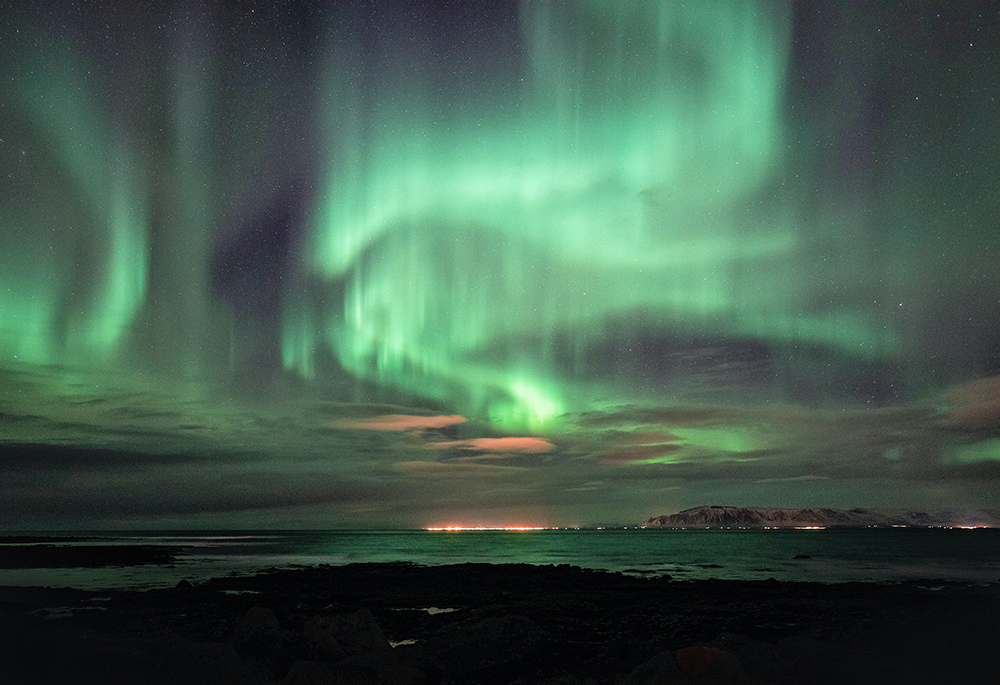
An aurora borealis is seen in a photo taken in Reykjavik, Iceland. The Spirit of Humanity Forum was held June 1-3 in Reykjavik. (Unsplash/Neil Mark Thomas)
One hundred-twenty leaders gathered in Iceland for the Spirit of Humanity Forum and I — having been invited by the Fetzer Institute — had the privilege of being one of them. The theme was "Healing a World in Crisis: Leading with Authenticity and Love." We gathered from around the world: Saudi Arabia, Egypt, Cameroon, South Africa, India, Belgium, Norway, Germany, Turkey, U.S., Indonesia, the Philippines, France, Switzerland, United Kingdom, the Czech Republic, Argentina, Thailand, Japan, Canada, Luxembourg, the Netherlands, and Iceland. I share the list to demonstrate the great diversity of cultures, languages, faces and faith traditions.
All are leaders in their various professions and organizations. This included professors, philanthropists, psychologists, theologians, artificial intelligence experts, climate crisis activists, U.N. affairs officers, current and former political officials, process experts, spiritual leaders, CEOs of major international and national organizations, artists, musicians, and health care workers. And we were of all ages — from our 20s to our 80s.
We came for many reasons; however, what was central was that we work and serve in a world in crisis and realize that we need to respond in new ways if we are to heal the systems that are tearing us apart.
The atmosphere created by the organizers of the forum invited us to meet each other as peers regardless of age, status, experience, or nationality. We did not receive a participant roster until the end of the second day, inviting us to meet each other without assumptions or biases. That freedom allowed us to share honestly and to listen to each other in refreshing ways.
Much of the forum was processes. What most of us knew was that all the organizational skill and expertise we bring to the work of co-creating our world in healthy, just, and sustainable ways is not enough. There is something missing and it is in how we do our work and the who we bring to our work.
Advertisement
The development of the inner self is critical to leading at these times. We began each day with 30 minutes of meditation, regardless of one's beliefs or spiritual orientation. What was important was the slowing down, the getting in touch with one's body, and quieting one's mind, so as to enter more fully into the experience. Many of the processes focused on the wisdom of our bodies — what we can learn if we stop thinking and allow our embodied selves to move us to insight and new responses.
I left encouraged and hopeful. In my work with the Institute for Communal Contemplation and Dialogue, I continually reflect on the integration of contemplation and transformation of not only our inner self but the outer world within which we engage. I feel the tension of wanting change now and wanting to move forward quickly, while knowing change will happen only when everyone involved feels respected, trusted and safe.
Being with others who are on a similar journey and who understand that there is another dimension to change — that involves what I would call a spiritual dimension — was powerful, and it expanded my awareness of how what I've been doing contributes to this larger whole.
Being together in communal contemplation is a powerful act. I think it was Carmelite Sr. Constance FitzGerald who once said that only the contemplative mind can hold both what is and what is possible.
I believe that as more and more of us wake up to the power of contemplative transformation, we will respond to the crises of our time out of love. And such responses will evoke new possibilities for our emerging future.







